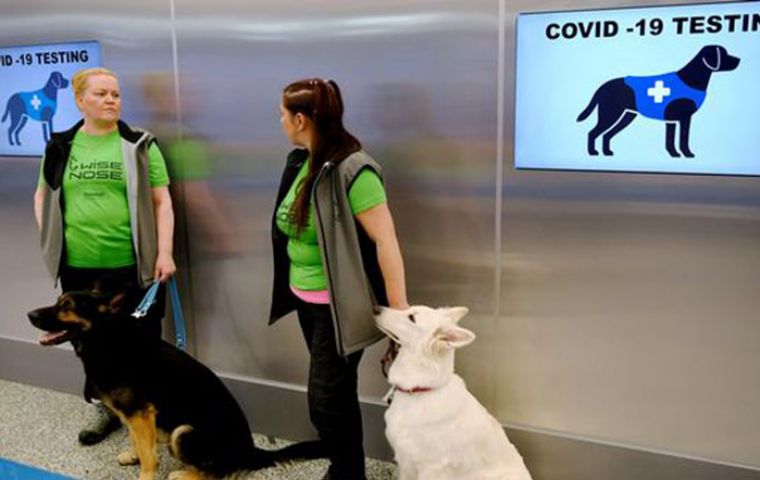MercoPress. South Atlantic News Agency
Dogs can be trained to detect Covid-19 infections even with asymptomatic patients, UK research
 London School of Tropical Medicine researchers wanted to see if dogs could detect a distinctive odor from chemical compounds associated with Covid 19
London School of Tropical Medicine researchers wanted to see if dogs could detect a distinctive odor from chemical compounds associated with Covid 19 Dogs can be trained to detect more than 90% of COVID-19 infections even when patients are asymptomatic, according to research published by the London School of Tropical Medicine.
Using their remarkable sense of smell - which can pick up the equivalent of half a teaspoon of sugar in an Olympic-sized swimming pool - dogs have already shown that they can sniff out maladies such as cancer, malaria, prostate problems and epilepsy.
Several previous studies have shown proof-of-concept that dogs can detect SARS-CoV-2.
Researchers from the London School of Tropical Medicine wanted to see if dogs could detect a distinctive odor given off from chemical compounds associated with someone who is COVID-19 positive but doesn't show symptoms.
They gathered samples of clothing and face masks from people who had tested positive for mild or symptomatic SARS-CoV-2.
Samples of the socks of 200 COVID-19 cases were collected and arranged in lab tests for six dogs that had been trained to indicate either a presence or absence of the chemical compound.
The dogs needed to be trained not to identify “false positives” in a bid to hack their reward system and obtain treats even if there were no COVID-19 samples in a given test.
“This means that the dog fully understands and gets a reward for a correct negative as well as a correct positive,” said Claire Guest, from the school's Faculty of Infectious and Tropical Diseases.
Overall, the dogs were successfully able to identify between 94 and 82 per cent of SARS-CoV-2 samples. The researchers then modeled how effectively these success rates, combined with traditional PCR tests, could help detect mild or asymptomatic COVID-19 cases.
They found that using dogs to screen arrivals at terminuses such as airports could detect 91% of cases, resulting in a 2.24 times lower rate of transmission than with PCR tests alone.




Top Comments
Disclaimer & comment rulesCommenting for this story is now closed.
If you have a Facebook account, become a fan and comment on our Facebook Page!